

Q: WHY DO WE CALL MONEY DOUGH?
A: Because everyone in the world kneads it.
All right, bad joke. Because for a lot of people, finding money to pay for a loaf of bread, shoes that fit, and a comfortable bed is no laughing matter. In fact, for over half of the world’s population, these are major luxuries. These are people who live in what the World Bank calls “moderate poverty.” That means living on less than $2 a day.
Even when you factor in countries’ different currency rates and standards of living, $2 isn’t much at all. In some areas of the world it would (barely) cover the cost of a pack of stickers.
Around the world $1 (U.S.) might buy:
Even in countries struggling with poverty, $2 just doesn’t go very far. Chances are your family eats more than a bit of pizza or a couple of burgers each day, right?
Are you wondering what causes some people to be rich and others poor? Before we try to answer that question, let’s talk about what poverty actually is.
How do we define poverty? That’s a big, complex question that lots of economists and social scientists have tried to tackle over the years. But there’s one person who did a pretty good job of giving it a whirl way back in the 1770s. He was a classical economist from Scotland named Adam Smith. His theory? Poverty was the lack of basic necessities of life. He called them “necessaries.”
Every society has an absolute minimum standard of living that includes things like shelter, food, clean water, and clothes. Everything a person needs to stay alive. That’s a given, right? But according to Smith, even if you had all those things, you would still be considered poor if you didn’t also have some extra items that your society thinks you need to be considered “decent.” In Smith’s day, he said everyone should have a linen shirt and a pair of leather shoes. If you didn’t own them, people would know you were poor.
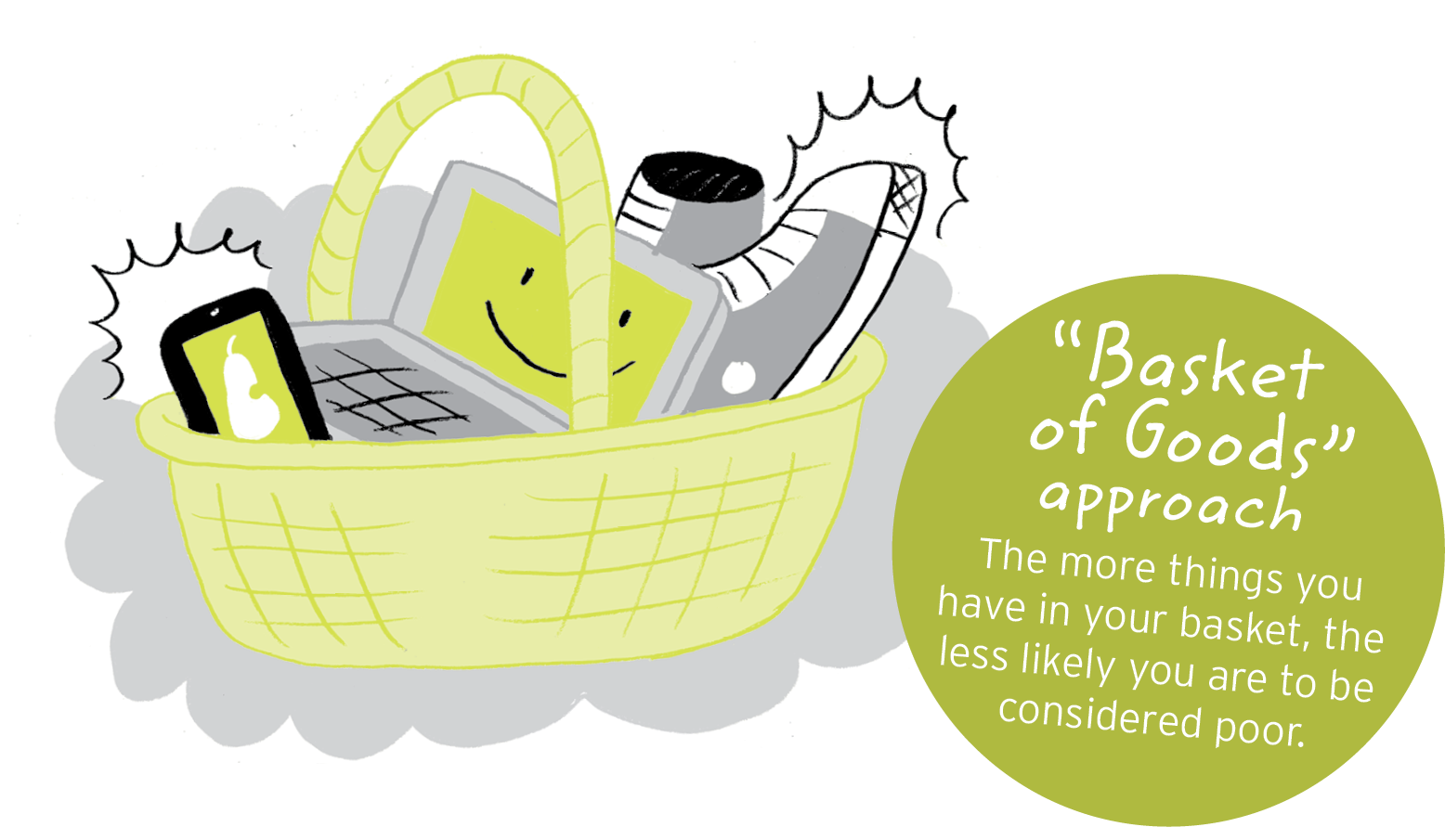
Smith’s conclusion: It’s these extras that help us go through life with dignity and without shame.
What was so neat about his definition was that is took location into account. He said that the “custom of the country” would dictate what the extra items would be. So say you live in the U.S. Having a pair of running shoes for gym class is pretty important. Without them, other kids in your class would likely notice and you’d probably feel uncomfortable when your teacher asked you again why you didn’t have them. At the same time, if you lived in India, where 27 percent of the population lives on less than $1 a day, going to school without your sneakers probably wouldn’t raise anyone’s eyebrow. The customs of each country are different.
We now call this the “basket of goods” approach. The more things you have in your basket, the less likely you are to be considered poor.
There, you just did it. Did what? By asking that question, you’ve just revealed the main problem with Smith’s definition. Because much of poverty is defined by a society’s extras, it leaves the door wide open for debate. That’s why you’ll find economic experts duking it out over whether a cellphone is required to live fully in our society today or something that is just nice to have. In other words, we have to ask ourselves what specific things, and how much of them, we need. A nice apartment? One sofa? Three beds? Two cars? Six pairs of jeans? Where do we draw the line?
In some ways, that line’s location depends on how we see the world. Anti-poverty advocates tend to include more items in their list of must-haves, while pro-business folks take the stance that, for example, a television is an amenity (i.e., a luxury), not a necessity.
So what would you include in your poverty basket? Take a minute and think about it. Chances are, it will be different from your friends’ baskets.
Not everybody uses the basket approach when dividing rich from poor. In Europe, some organizations figure it out another way: If you have less than 60 percent of what the average person makes, you’re considered poor. (It’s a little more complicated than that. The experts throw around words like “median income” and “income distribution,” but this is the basic idea.)
In the U.S. and Canada, experts come up with an absolute, specific number known as the poverty line. For instance, in 2008 the poverty line in the U.S. was pegged at $29.58 a day for a single adult under the age of 65. Many European experts find this thinking a little weird—after all, can you really say someone is poor if he makes $29.57 a day, but that the same person would be doing okay if making $29.59?
What’s fair, or even logical, about that?
Have you ever heard about the fight for equality for women in the workplace? Ever wondered just how that was going? Here’s the (raw) deal: In a lot of countries, school is still not promoted for girls. Women in these places often end up working out of their homes or in other informal—or even dangerous—settings. The pay is lousy, and forget about benefits like sick leave or paid breaks: They don’t exist.
With so many women either toiling away at crummy jobs or not working at all, whole countries suffer. Think about it. What would happen if half a nation’s population ditched their lousy jobs and went to university instead? And what would happen if those college grads then landed awesome jobs bringing in the bigger money? There would be new thinkers, new dreams, and new ideas flying all over the place. People would have more money to spend in their nation’s economy, too. Education is power and entire families and countries would benefit.
Many politicians, journalists, and researchers say opening up the whole world to all women is possibly the single best way to make life better in developing nations.
Let’s pretend it’s Saturday. Allowance day! And now you’re going to take some of your cash down to the corner store and spend it on a Choco-Dreambar 2000. But wait! There’s something you’ve got to know before you take your first bite. Sorry to break this to you, but that cocoa is loco. It’s gone bad, but not in the way you’d expect.
The thing is, in order to harvest the cocoa beans for much of the world’s chocolate, thousands of people—even kids—toil for little or no money. Think hot sun, dangerous tools, exposure to chemical pesticides, and walking long hours in the grueling heat. And…these kids are so busy working, they can’t go to school.
Everybody—if they want to stop poverty cold and live a happier, better life. Even though it seems like ditching school and hitting the job market to make some fast money would be a great idea, it’s not. Because as this cocoa story shows, work isn’t always a good thing if people are forced to take on icky, abusive, or dangerous jobs that make them feel sick or sad.
Think this only happens in other countries? Think again. We see a similar situation play out closer to home when people work at low-paying jobs that are like personal one-way tickets to Nowhereville.
Here’s what I mean. Let’s say your favorite auntie, Lisa, is making just a little over minimum wage at a job that’s boring and repetitive. It’s just barely enough to pay for rent, food, and clothes for her family. So she asks for more shifts so she can make more cash. Only one problem with that: She really wants to go back to school so she can gain more skills and get a better job—but now that she’s working so many hours, there’s just not enough time. Before you know it, your fave family member is caught in a nasty cycle that keeps her from eventually finding a great job and kicking poverty to the curb.
Think of it this way. Working for money should make our lives better, not worse, right?
So sure, it’s easy to take school for granted—or hate it, even—when our government offers it for free. But don’t forget, many countries around the world either expect families to fork over money so their kids can get an education, or offer few schools in poor, rural areas. This is a big drag because a lot of families who live there tell us they would send their kids to school if they could. They know that school = jobs = no more poverty.
You’re right. It isn’t fair. We live in a world where inequality rules the day. Depending on where you woke up this morning, you might snarfle down a bowl of cereal and then grab a banana on the way to school—or crawl out from under a blanket on the street and dig around for something to eat for your little brother.
How did this happen? Why do some countries, and the people who live in them, seem to need more financial help than others? This is not an easy question to answer, but there are some reasons that seem to pop up.

It’s hard to stop being poor if you’ve been poor a long time. Poverty usually builds up over many years, so don’t expect to squash it in a few short weeks, months, or even years.
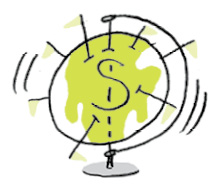
Countries that are located closer to richer countries often do better than ones that are separated from them. That’s not always the case—Mexico shares a border with the United States, but struggles with poverty.

Countries swimming in water, minerals, or lumber usually become rich. But sometimes natural resources hurt. Diamonds and oil can spark fights and even wars.
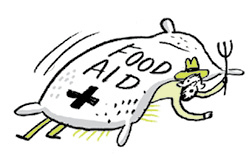
Free food! Good idea, right? Some experts caution that if rich countries send food aid to poor countries when it’s no longer an emergency, local farmers can’t compete with the prices and are driven out of jobs.

In some parts of Africa, a quarter of crops rot before anybody can eat them! The technology systems might be bad, and there can be insect infestations, mold growth, or other damage due to heat and humidity.

Looking for a sure-fire way to bankrupt a nation? Go to war for a long time. The more money that goes to feeding the war machine, the less there is for schools, medical care, and other things that make life safe and fun.
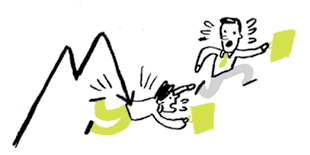
Sometimes the economy tanks and people start losing their jobs. If enough of them get fired or laid off, they can’t pay for stuff. If they can’t pay, other people lose their jobs. The cycle continues…

Some people in political power are only looking out for Number One. They use money that should be going to their people to line their own pockets. The powerful get rich and the rest stay poor.
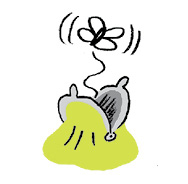
Sometimes the country itself isn’t to blame for a person’s dire financial situation. In some cases, people are simply bad at handling their money, no matter where they live.
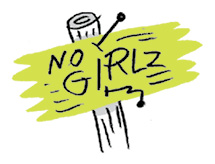
Many nations allow only men to work. That means about 50 percent of a country’s smart, talented people aren’t able to contribute great things.
Looking for one more reason that poor countries tend to stay that way? Sometimes poverty has nothing to do with school, jobs, politics, or anything else people can actually change. That’s right. I’m talking about the weather.
Historically, hot countries are poorer than cold countries. Tropical weather creates perfect conditions for diseases such as malaria, little parasites in drinking water, and leprosy. Sick people can’t work, so productivity (the amount of work people do) plummets. The hope is that as medical technology grows, more people will feel like a million bucks. Take Singapore. Even though it’s often hot there, it’s considered a very productive country today.
Great news. Passionate grown-ups and kids all around the world are coming up with new ways to do good and feel good, too. We’re volunteering to teach villagers in Ghana new ways to keep garbage away from source water to make it safe to drink. We’re building websites that with a click of a button make it easy for anyone with a computer to raise money and buy food and medicine for others who are hungry or ill. Some kids are even creating their own charities.
And the rest of us? We’re taking a few moments out of our day and donating money.
And it has to do with the word “poor.” I’ll tell you, I much prefer the word “broke” instead. Because think about it. “Poor” has an unbelievable amount of baggage attached to it. Call somebody poor and you’re telling them they are less than someone else.
That’s not fair. Maybe the person is an amazing singer or can do funky things with her thumbs. Maybe he’s the smartest kid in the school or an incredible athlete. But call someone “poor” and you’re not seeing the whole person. Call them “broke” instead? Then it’s just about the money, honey.
Broke is a state of being. Poor is a state of mind.
That’s my two cents.

Here’s one awesome reason to give away money instead of keeping it all to ourselves: Giving makes us feel good. Hey, our spit doesn’t lie.
Huh? Spit?
Seriously. A few years ago, Elizabeth Dunn, a psychology professor at the University of British Columbia who studies money and happiness, came up with an experiment that went something like this: She had a class play “the dictator game.” Some students, the “dictators,” were given $10 in coins and paired up with other students. Then they were given a choice: How much of their money would they give to their partner? (Remember, this was real money they could keep after the game was over.) Some people gave away all their money. Some people gave away nothing. Most fell somewhere in between.
As it turns out, the more money people gave away, the happier they ranked themselves later.
After the game was over, the students also put a piece of special cotton, called Salivette, in their mouths to offer spit samples. The saliva results confirmed everything. People who kept more of the money for themselves felt more shame. And the more shame they felt, the higher their stress hormones.
“It was kind of fun because we can see these effects turning up not only in their emotion ratings, but also in their saliva,” says Elizabeth now.
Another day, she sent her assistants to give $5 and $20 bills to strangers. Half of the strangers were told to spend the money on themselves; the other half had to spend it on others. When the results came back, the researchers learned that, again, people who spend “pro-socially” (in other words, on gifts or charities) are a happier bunch.
But what causes the bliss? Does giving really make us happy, or are generous people simply more joyful? It’s hard to say, admits Elizabeth, although the results from some of her experiments suggest that people definitely get a happiness boost from giving.
“Either way, we see that happiness and spending on others seem to like to hang out together,” she says.
Want to take the concept of giving even further? Jump in! Get involved! Make a difference! All the people who work and volunteer at these cool charitable organizations do.
Bzzz. Slap. Darned skitters! For many of us, mosquitoes are a summer nuisance. But for others, they can be deadly. Malaria, a disease some mosquitoes carry, actually kills nearly a million grown-ups and kids each year. The United Nations launched a campaign called Nothing But Nets in 2006 to get people donating money for nets that hang around people’s beds to keep them safe from the blood-hungry, disease-carrying buzzers. Hello, net. Good-bye, mosquito.
After watching the movie An Inconvenient Truth, 12-year-old Alec Loorz from California wanted to give other kids the scoop about global warming. Now, a few years later, his organization, Kids vs. Global Warming, spreads the word and shows people how to recycle, plant trees, grow their own food, and travel using their body’s own power.

Q Studying the way people deal with their money is interesting. Is this what you always wanted to do when you grew up?
A Actually I wanted to be an actress! I kind of get to be one, though, because I get up on stage and talk to big groups of people about my work now.
Q What’s the most surprising thing you’ve learned about feelings and money?
A Money doesn’t seem to provide as much happiness as people expect. So instead of focusing on how much we’re going to earn, maybe the best thing people can do is to think more carefully about how they’re going to spend what they’ve got.
Q Okay, so knowing what you know now about money and happiness, let’s say somebody gave you $20,000. What would you do with it?
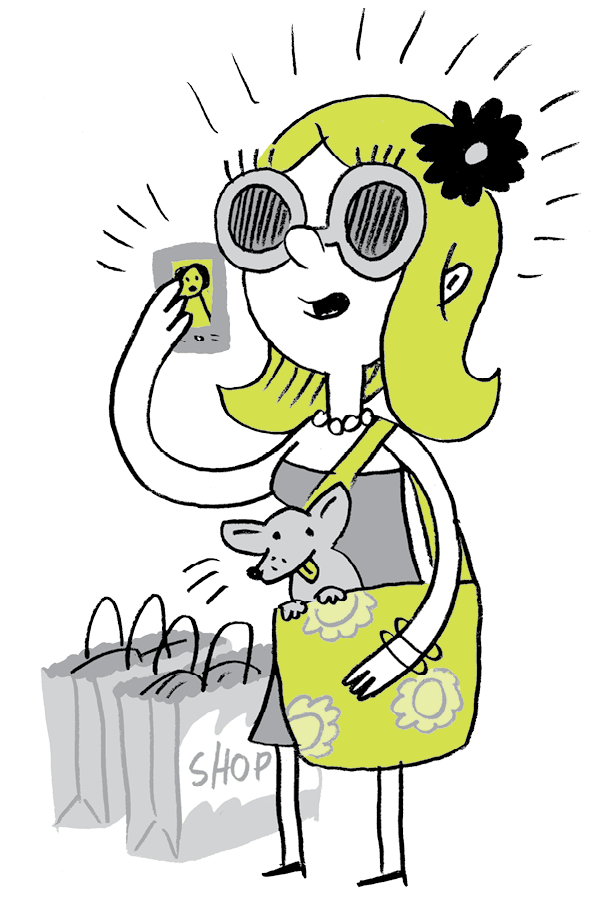
A I would definitely use a lot of it to benefit other people. I would also try to use it to have some neat experiences that I might not otherwise get. (Research shows that spending money on experiences, like riding horses or going skiing, makes us happier than buying things.) And I would treat myself to little pleasures and keep a stock of money set aside to pay for them.
Q Would you save any of it?
A Well…I guess so.
Q It wouldn’t make you happy?
A That depends on what I would eventually spend it on!
Want to unload a few books you no longer read? Just look for a Reading Tree bin near you and dump them in. Reading Tree takes books that might end up in the landfill and gets them into the hands of readers all over the United States and Canada. Book too beat up to read? No worries. The organization also recycles them.
Swooping through the night sky and making skin prickle all over the world. Why the heck do we need to save the bat? Bat Conservation International in Texas says bats are wildly misunderstood little critters that are important to our ecosystems. Leaving the flying insect annihilators to fend for themselves is just batty.
All work and no play? No way! Right to Play, an organization that started in Toronto, gets over 700,000 children around the world jumping, hopping, and playing sports. For kids who have been stuck in war-torn areas or turned into child workers, it’s the first time they’ve ever had a chance to just be kids.
When it comes to giving money away, people in the U.K. seem to have their wallets open more than anyone else. A little more than eight out of ten Brits give to charity. Canada comes second, with 77 percent of Canadians saying they sign away some cash each year. Other interesting results:
Forty-nine percent of Americans say they think animal charities are the most worthy cause.
In India, donators are most passionate about keeping kids healthy and happy.
The Swiss are most worried about fighting climate change.
(Source: UnLtdWorld)
Sometimes individual charities, foundations, and organizations aren’t enough. Remember when we talked about the causes of poverty a few pages back? Sometimes entire countries are so broke and broken, they need lots of outside help. That’s where organizations like the World Bank and the International Monetary Fund come in.
Let’s answer that with a little history lesson: The World Bank was launched in 1944 at the tail end of the Second World War. At first, it was meant to give devastated countries money to rebuild their war-ravaged cities and to get their economy back on its feet again. France—a nation that was particularly ruined by German occupation and numerous battles—was the first country to use the money.
Since then, however, the World Bank has become less concerned with helping countries clean up after wars. Instead, it’s more concerned with trying to slash poverty in the world’s least developed areas. It gives out billions of dollars in loans and grants each year, and has brought clean water and electricity to millions of people. Most of its money comes from its own borrowing and from the 184 countries that are its members.
At first glance, this World Bank idea all seems pretty nifty. Sure enough, there are a lot of people who like what the World Bank is supposed to do…but don’t like how they actually do it. Sometimes, it refuses to give money to corrupt countries that have dictators. That kind of makes sense. Why would you give money to someone who might turn around and keep it for himself and his evil buddies?
Here’s the problem: Why does the Bank get to decide who is corrupt and who isn’t? Also, some argue that withholding money hurts the people in that country—the ones who are really struggling—far more than the dictator. In addition, there’s criticism that the interest the World Bank charges for its loans is too high for these countries to pay back. As a result, the countries just end up racking up even more debt than they started with (and are now worse off than before). In the past few years, though, the World Bank has found ways to bring that interest rate down.
Great question. A lot of people can’t tell the difference between the two organizations. Both of them loan out money to countries in need. (Remember Bubbleland on pp. 84–85?) But the IMF is actually a little different than the World Bank. For starters, it loans money to any country that needs it. Iceland, for example, received money from the IMF when it faced a monumental credit crunch. IMF loans are intended to be short-term fixes so a country can get back on its feet again. The World Bank, however, is often in it for the long haul.
Charities that try to help people one dollar at a time. Billion-dollar loans from the World Bank and the IMF. But there’s also another way to give everyone, no matter where they live, a chance to go from day-to-day survival to having enough money to live on and even plan for the future.
It’s called microcredit. Read on to find out how it works!
